
The Nuremberg trials were held by the Allies against representatives of the defeated Nazi Germany for plotting and carrying out invasions of other countries across Europe and atrocities against their citizens in World War II.

Judgment at Nuremberg is a 1961 American epic legal drama film directed and produced by Stanley Kramer, and written by Abby Mann. It features Spencer Tracy, Burt Lancaster, Richard Widmark, Maximilian Schell, Werner Klemperer, Marlene Dietrich, Judy Garland, William Shatner, and Montgomery Clift. Set in Nuremberg, West Germany, the film depicts a fictionalized version – with fictional characters – of the Judges' Trial of 1947, one of the twelve Nuremberg Military Tribunals conducted under the auspices of the U.S. military in the aftermath of World War II.

Maximilian Schell was a Swiss actor. He won the Academy Award for Best Actor for the 1961 American film Judgment at Nuremberg, his second acting role in Hollywood. Born in Austria, his parents were involved in the arts and he grew up surrounded by performance and literature. While he was still a child, his family fled to Switzerland in 1938 when Austria was annexed by Nazi Germany, and they settled in Zürich. After World War II ended, Schell took up acting and directing full-time. He appeared in numerous German films, often anti-war, before moving to Hollywood.

The Doctors' Trial was the first of 12 trials for war crimes of high-ranking German officials and industrialists that the United States authorities held in their occupation zone in Nuremberg, Germany, after the end of World War II. These trials were held before US military courts, not before the International Military Tribunal, but took place in the same rooms at the Palace of Justice. The trials are collectively known as the "subsequent Nuremberg trials", formally the "Trials of War Criminals before the Nuremberg Military Tribunals" (NMT).

The Scottsboro Boys were nine African American male teenagers accused in Alabama of raping two white women in 1931. The landmark set of legal cases from this incident dealt with racism and the right to a fair trial. The cases included a lynch mob before the suspects had been indicted, all-white juries, rushed trials, and disruptive mobs. It is commonly cited as an example of a legal injustice in the United States legal system.
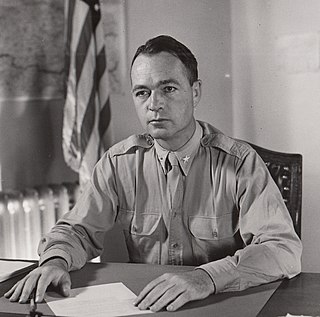
Telford Taylor was an American lawyer and professor. Taylor was known for his role as lead counsel in the prosecution of war criminals after World War II, his opposition to McCarthyism in the 1950s, and his outspoken criticism of American actions during the Vietnam War.

The Judges' Trial was the third of the 12 trials for war crimes the U.S. authorities held in their occupation zone in Germany in Nuremberg after the end of World War II. These twelve trials were all held before U.S. military courts, not before the International Military Tribunal, but took place in the same rooms at the Palace of Justice. The twelve U.S. trials are collectively known as the "Subsequent Nuremberg Trials" or, more formally, as the "Trials of War Criminals before the Nuremberg Military Tribunals" (NMT).

The subsequent Nuremberg trials were twelve military tribunals for war crimes committed by the leaders of Nazi Germany (1933–1945). The Nuremberg Military Tribunals occurred after the Nuremberg trials, held by the International Military Tribunal, which concluded in October 1946. The subsequent Nuremberg trials were held by U.S. military courts and dealt with the cases of crimes against humanity committed by the business community of Nazi Germany, specifically the crimes of using slave labor and plundering occupied countries, and the war-crime cases of Wehrmacht officers who committed atrocities against Allied prisoners of war, partisans, and guerrillas.

The United States of America vs. Alfried Krupp, et al., commonly known as the Krupp trial, was the tenth of twelve trials for war crimes that U.S. authorities held in their occupation zone at Nuremberg, Germany, after the end of World War II. It concerned the forced labor enterprises of the Krupp concern and other crimes committed by the concern.
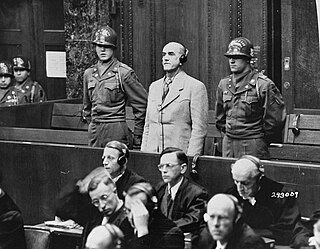
The Pohl trial against the Nazi German administration of the "Final Solution" was the fourth of the thirteen trials for war crimes that the United States authorities held in their occupation zone in Germany in Nuremberg after the end of World War II. The thirteen trials were all held before U.S. military courts, not before the International Military Tribunal, although both courts presided in the same rooms at the Palace of Justice. They are known collectively as the "Subsequent Nuremberg Trials" or more formally, as the "Trials of War Criminals before the Nuremberg Military Tribunals" (NMT).
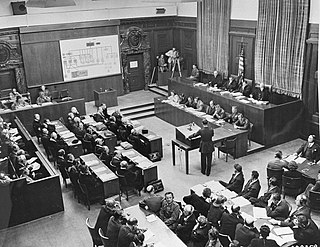
The United States of America vs. Carl Krauch, et al., also known as the IG Farben Trial, was the sixth of the twelve trials for war crimes the U.S. authorities held in their occupation zone in Germany (Nuremberg) after the end of World War II. IG Farben was the private German chemicals company allied with the Nazis that manufactured the Zyklon B gas used to commit genocide against millions of European Jews in the Holocaust.

Playhouse 90 is an American television anthology drama series that aired on CBS from 1956 to 1960 for a total of 133 episodes. The show was produced at CBS Television City in Los Angeles, California. Since live anthology drama series of the mid-1950s usually were hour-long shows, the title highlighted the network's intention to present something unusual: a weekly series of hour-and-a-half-long dramas rather than 60-minute plays.

The RuSHA trial was a trial against 14 SS officials charged with implementing Nazi racial policies.

The Einsatzgruppen trial was the ninth of the twelve trials for war crimes and crimes against humanity that the US authorities held in their occupation zone in Germany in Nuremberg after the end of World War II. These twelve trials were all held before US military courts, not before the International Military Tribunal. They took place in the same rooms at the Palace of Justice. The twelve US trials are collectively known as the "Subsequent Nuremberg trials" or, more formally, as the "Trials of War Criminals before the Nuremberg Military Tribunals" (NMT).
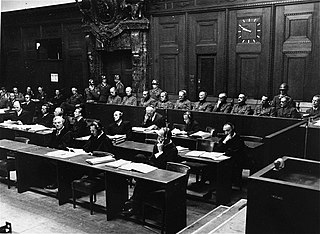
The Hostages Trial was held from 8 July 1947 until 19 February 1948 and was the seventh of the twelve trials for war crimes that United States authorities held in their occupation zone in Germany in Nuremberg after the end of World War II. These twelve trials were all held before US military courts, not before the International Military Tribunal, but took place in the same rooms at the Palace of Justice. The twelve US trials are collectively known as the "Subsequent Nuremberg Trials" or, more formally, as the "Trials of War Criminals before the Nuremberg Military Tribunals" (NMT).

The Ministries Trial was the eleventh of the twelve trials for war crimes the U.S. authorities held in their occupation zone in Germany in Nuremberg after the end of World War II. These twelve trials were all held before U.S. military courts, not before the International Military Tribunal, but took place in the same rooms at the Palace of Justice. The twelve U.S. trials are collectively known as the "Subsequent Nuremberg Trials" or, more formally, as the "Trials of War Criminals before the Nuremberg Military Tribunals" (NMT).

Louis Rudolph Franz Schlegelberger was State Secretary in the German Reich Ministry of Justice (RMJ) who served as Justice Minister during the Third Reich. He was the highest-ranking defendant at the Judges' Trial in Nuremberg.
Abby Mann was an American film writer and producer.
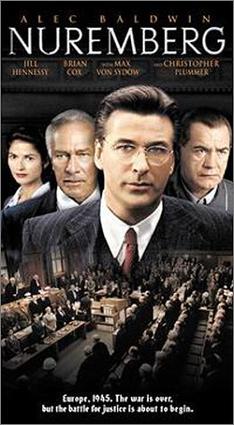
Nuremberg is a 2000 Canadian-American television docudrama in 2 parts, based on the book Nuremberg: Infamy on Trial by Joseph E. Persico, that tells the story of the Nuremberg trials. Actual footage of the Nazi Concentration Camps (film) was included in this miniseries.

Oswald Rothaug was a Nazi jurist.



















